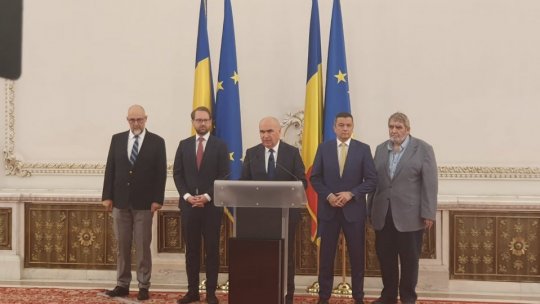Personal data processing in Romania
The leaders of the Romanian political parties have announced they have found the best solution for personal data processing and private life protection.

Articol de Radio România Internaţional, 07 Mai 2015, 16:09
Politicians in Bucharest are working on new regulations likely to strike a balance between citizen freedoms and public safety.
Invited to consultations on this issue by the President Iohannis on Wednesday, they have agreed to support a new draft law regarding access to personal information in the e-communications sector.
This draft law is aimed at covering the legislative gap generated by the rejection last year, by the Constitutional Court, of some bills on the same issue, which ran counter to the Constitution.
According to the Presidency, the new draft law offers additional guarantees for the protection of the right to private life. Insistently demanded by the civil society, the new legislative proposals have also been agreed on by politicians.
"The solution proposed by the President is a very good one, in keeping with the Constitutional Court’s decision. At the same time, it provides the state institutions with the tools they need to fight terrorism and other crimes, in keeping with the law", PM Victor Ponta said.
In his turn, Gabriel Oprea, head of the National Union for the Progress of Romania, part of the government coalition, says that the draft law guarantees national security and also observes individual rights.
The leader of the main opposition party, the Liberal Alina Gorghiu, has said in her turn that the bill observes both the Constitutional Court’s decision and the requirements of the European Convention for Human Rights.
"An important amendment brought to this law is that accessing traffic data is allowed only in special cases, and only by a Court order or by approval of a judge."
Also in opposition, the Democratic Union of Ethnic Hungarians in Romania has already announced that it will propose several amendments on setting the duration of data storage at minimum six months and maximum two years, an idea agreed upon by the parliamentary group of the other national minorities.
Once the new law is passed by Parliament and validated by the Constitutional Court, this whole political-legislative saga might finally end.
Tabled by the Government and inspired by the special services, the so-called Big Brother laws, rejected by the Constitutional Court, have sparked off a dispute between the Constitutional Court judges and the former Romanian Intelligence Service chief, George Maior.
At the time, Maior protested the Court’s decision, arguing that if a terrorist attack took place, it would be the judges’ fault for not having provided the Service with the necessary legislative tools to prevent it.
His reaction came right after the massacre at the offices of satirical magazine Charlie Hebdo in Paris, when the emotional reaction of the whole world made the intelligence services’ request seem justified.
One thing is sure, though. Intelligence services can do their job even without the Big Brother laws, as no terrorist attacks have been committed in Romania.














